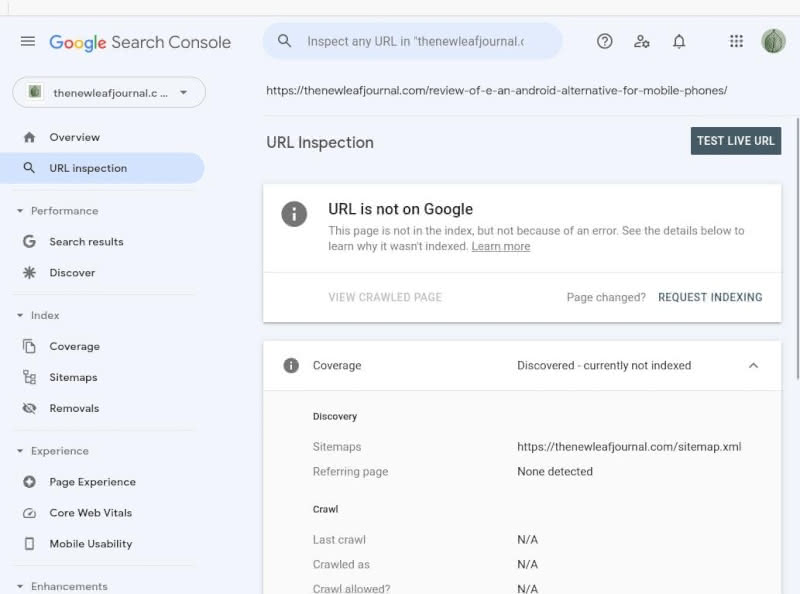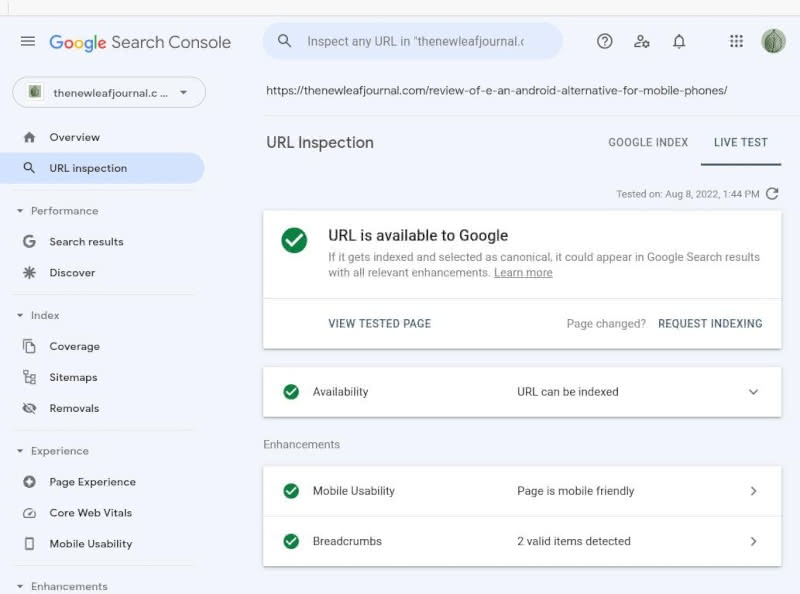I discussed indirectly in a recent post that I have a Google Search Console (formerly “Webmaster”) account. The main benefits of this account are that it allows me to manage our sitemap submission, request indexing and de-indexing of posts, and see Google Search statistics for The New Leaf Journal (lest there is any confusion, we do not use Google Analytics, which is distinct from the statistics provided by Search Console).
There have been times where we had some difficulty ensuring our posts were being expeditiously indexed by Google, meaning included in Google Search results. The height of our problems came with our previous hosting, but once I moved The New Leaf Journal to a better server, our indexing issues were almost entirely ameliorated. I accidentally created a minor issue with the intersection of an anti-bot measure and a particular caching method, but that issue too has passed.
As of August 7, 2022, there are only ten New Leaf Journal articles and Leaflets that are designated as “discovered but not currently indexed” (note this would exclude the few posts that I designated as not being amenable to indexing). Eight of the ten posts were published within the last two weeks, meaning that Google’s recalcitrance with respect to their speedy indexing (a problem not generally shared by Bing, I might add) is a little bit annoying, but the posts will likely be indexed soon.
However, Google has been consistent for a longer period about not indexing two posts that it has discovered, notwithstanding the fact that tests turn up no issues with the ability for them to be indexed. Note too that both posts are indexed by Bing. The first of these two posts is an article on strange refrigerator graffiti. While I am not sure why Google will not index it, it was highly unlikely that it would make much of a search impression (my graffiti posts that have performed well referenced specific prolific taggers).
It is the second post that Google will not index that raises some questions. Back on November 21, 2021, I published an article titled Review of /e/ – An Android Alternative For Mobile Phones.


As the name suggests, this post is a review of /e/ OS, an alternative free and open source mobile operating system that is forked from LineageOS, which in turn is forked from Android. The primary selling point of /e/ OS is that it mostly replicates Android’s feel and functionality (it is also capable of running most Android apps), but it does not “phone home” to Google or contain other proprietary bits that may compromise the user’s privacy. This, unlike my refrigerator graffiti aside, was a post that I had some hope for in terms of attracting visitors. Despite its being shunned by Google, it is currently (as of the writing of the instant article) our 32nd most-read article of 2022, and based on the views that it accrued from January 1, 2022 through August 7, 2022, it would be the 22nd most-read article of 2021 (as in more views than all but 21 articles in 2021).
No one who regularly reads The New Leaf Journal will confuse me as a fan of proprietary big tech. I run Linux on all of my computers and /e/ OS and LineageOS on my mobile devices. I tout feeds as alternatives to consuming news through big tech portals, promote alternative search engines, and even write a bit about alternative social media software and platforms. Noting all of that, I will state for the record that it is not my position that Google’s reluctance to index my /e/ OS review is definitely triggered by the fact that it is a review of an alternative to one of Google’s most lucrative properties. For example, I have not had indexing issues with my alternative social media posts, and one of my best-performing Google articles (and best-performing articles period) is a comprehensive review of my favorite F-Droid apps, currently the 3rd most-read article of 2022. It was published one week after the /e/ OS review. F-Droid, for those who do not know, is a free and open source Android application repository (it also works on Android forks like LineageOS and /e/ OS, as well as more distant relatives such as Amazon’s Fire OS and the now-defunct BlackBerry 10) that effectively serves as an alternative to the Google Play Store. In light of the fact that F-Droid makes it possible (“practical,” however, depends on what one uses his or her phone for) to use an Android device without connecting it to a Google account, one could argue that it would be more distasteful to Google’s business model than a very niche Android fork with a tiny user-base. Moreover, my July 2021 posts on replacing Android on two Google Nexus 7 (2013) tablets with Ubuntu Touch and LineageOS respectively are, at the moment, the 5th and 24th most-read articles of 2022, and both have benefited from discovery through Google Search.
(August 11, update: I scheduled this article to be published on August 9, 2022, while I was on vacation. On August 10, one day after I scheduled this post but before it went live, someone shared it on Hacker News while I was flying. It reached page 1 and is now the most-read New Leaf Journal article of 2022. It was 32nd when I scheduled the post, however.)
Now, this is not to say that my /e/ OS article is not being indexed on account of its title and content (and note that I took the position in my review that Android may be better than /e/ for many users based on needs, including some with an interest in privacy), but it could be random bad luck or the kind of Google Search Console weirdness that seems to have hit my magisterial review of Bed-Stuy refrigerator graffiti. Moreover, as I discussed in an article about a different site being de-indexed by Bing, there are more serious non-uncommon indexing and de-indexing issues.
However, regardless of the reason, that of all the articles that I have published, Google is now on month eight of not indexing a balanced review of an alternative to Android despite having indexed (to the best of my knowledge) every other New Leaf Journal article from that month does not look great, nor does it look the best. I hope that the situation is resolved eventually so that my /e/ OS review can be discovered by people using Google Search (i.e. the majority of people using the internet).